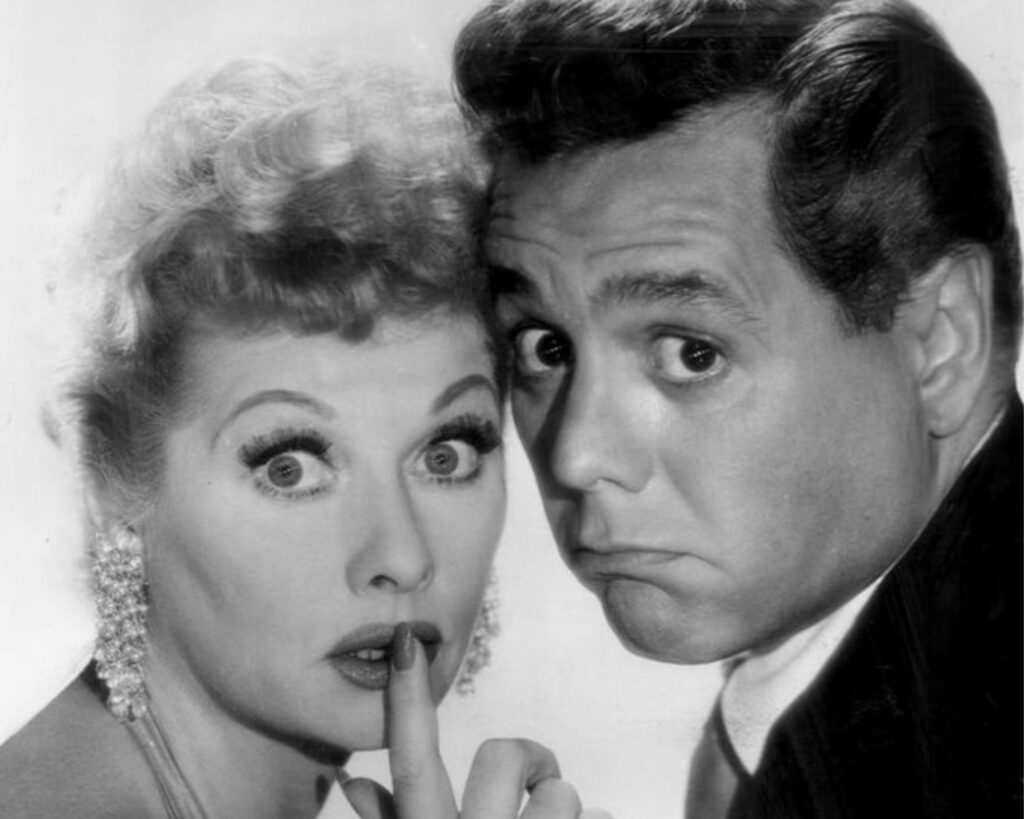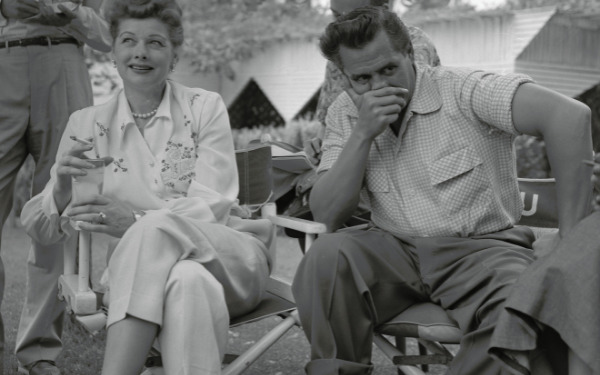Amy Poehler Loves Lucy AND Desi
A new documentary about the legendary Hollywood power couple of Lucille Ball and Desi Arnaz premiered on Amazon on March 4.
Succinctly titled Lucy and Desi, this Amy Poehler docufilm strives to reveal the true essence of the two sitcom stars by utilizing never before heard audio clips in conjunction with stock footage from the pair’s storied careers. Most of us are familiar with the tumultuous and sometimes scandalous relationship between Lucy and Desi, but this film tries to steer us away from that and instead focuses on their mutual love and admiration for one another.
The film chronicles the early careers of Lucy and Desi and does a good job of examining the underlying motivations each of them had to make successes of themselves. Ball, from Jamestown New York, came from a poor family and sought out Hollywood so she could financially support them. In contrast, Arnaz was born into a wealthy family and enjoyed a rather stress-free upbringing. His father was the mayor of his home city of Santiago de Cuba and a member of the Cuban House of Representatives. However, when the government was overthrown during The Cuban Revolution, his father was put in jail and his assets were seized. The family lost everything. Upon his father’s release from jail six months later, Desi and his family fled to the United States where he was determined to recreate the idyllic livelihood he had known as a child.
These underlying motivations fueled their impressive work ethic which was a huge component to the success of I Love Lucy. Ball was known to rehearse for hours on end until she worked out all the nuance and physical comedy that her scenes demanded. Arnaz, on the other hand, quickly displayed a talent for producing. He was able to secure a strong production team around them and ultimately was responsible for helping to develop the multiple camera setup that the series originated. He was also the person to get the show filmed so that stations would no longer need to rely on kinescope images and had it filmed in front of a live studio audience because it enhanced Ball’s performance.

I Love Lucy was produced by the couple’s company Desilu Productions. As the show dominated the ratings and became more successful Desilu grew, producing shows such as Our Miss Brooks and Shower of Stars. Arnaz also brokered a deal that allowed the company to retain the rights to every episode of I Love Lucy after its initial airing. When CBS finally paid them out to retain ownership of the show, it gave Arnaz and Ball the financial means to buy RKO Pictures which ultimately became Desilu Studios.
By the time the show ended in 1957 Lucy and Desi were on top of the world, at least professionally. Their home life was another story. From the very beginning of their marriage there was always trouble linked to Desi’s drinking and womanizing. Their success did nothing to hinder that and, in some ways, exacerbated it. Lucy was the star and it proved very difficult for Desi to live in her shadow. In addition to that, the demands of running Desilu Studios took their toll on him and he turned to his vices for comfort. By the time work began on The Lucy-Desi Comedy Hour in late 1957, the two were having a hard time getting along and Ball was desperately unhappy.
It is at this point in the movie that the filmmakers seem to take pity on Arnaz. He is presented as an overwhelmed man just trying to live up to his immense responsibilities. The narrative is guided by several interviews of which the couple’s daughter Lucie Arnaz Luckinbill is heavily featured. She would describe Ball’s “hard edge” with Arnaz and claim that she hurt him with her words while he hurt her with his actions. That’s pretty much as far as the documentary goes into Arnaz’s infidelity. It remains somewhat unclear whether director Amy Poehler and writer Mark Monroe wanted to avoid sensationalism or if they were appeasing Luckinbill who obviously wouldn’t want her father portrayed in such a negative light.
The film goes on to reveal that once they divorced in 1960, Lucy and Desi were finally able to be civil with one another and become friends again. Ball’s “hard edge” towards Arnaz disappeared and they were able to move forward to co-parent their kids. Their professional relationship, however, ended for good in 1962 when Ball bought Desi out of Desilu Studios. We are led to believe that the stress and drinking rendered him ineffective in his role forcing Lucy to step up and become the first female CEO of a major television and movie production company. She would later sell her interests in 1967 to the company that would ultimately become Paramount.
At this point in her career Lucy continued to work on The Lucy Show and then Here’s Lucy. She would later go on to make notable guest appearances on a variety of shows and specials. She became a mentor to young comediennes coming up in the business. The documentary highlights this aspect of her life through interviews with Carol Burnette and Bette Midler, both of whom Ball took under her wing.
Lucy and Desi would remain friends all the way until the end of Arnaz’s life in 1986. When the end was near Lucy came to visit him and according to their daughter watched some old reruns of I Love Lucy. Sometime later, before he slipped into a coma, Lucie Arnez called her mother to let her know Desi didn’t have long. She put Lucy on the phone with him and she describes the last words her parents said to each other, a conversation which happened to take place on their wedding anniversary of November 30th.
All things considered this is a good documentary. It does its best to repackage a story fans are familiar with in a palatable and respectful way. Although there is not much in terms of new information it was interesting to gain insight into the minds of both Lucy and Desi. Poehler and crew were able to access some great audio on which both of the stars deliver some insight into their thoughts and behavior. Clocking in at an hour and forty minutes, this film is definitely worth a watch, even if only for the I Love Lucy clips.






